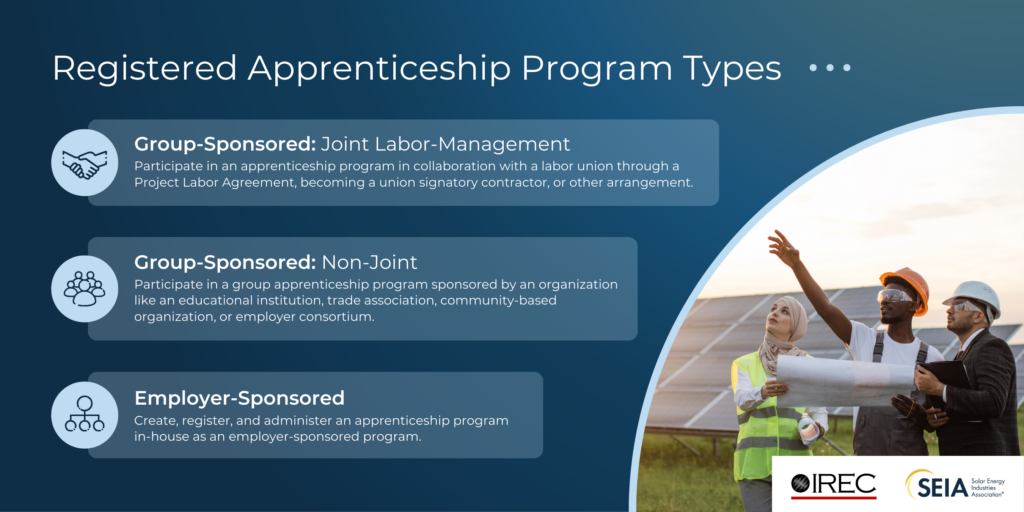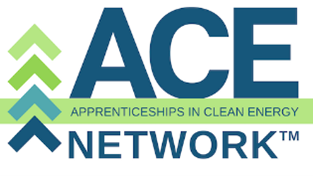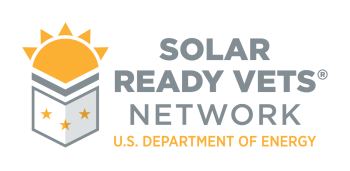Registered Apprenticeship Programs
highlights
How to Get Started in Registered Apprenticeship
If your company is new to Registered Apprenticeship, you may want to explore each of these sections below to for information and resources to help you get started.
1. Consider Apprenticeable Occupations that are relevant to your company
Registered Apprenticeship Programs (RAPs) are paid jobs that prepare workers for careers while meeting the needs of businesses for a highly skilled workforce.
According to the U.S. Department of Labor Office of Apprenticeship, the key components of Registered Apprenticeship Programs include the following:
- Industry Led – Programs are industry-vetted and approved to ensure alignment with industry standards and that apprentices are trained for highly skilled, high-demand occupations.
- Paid Job – Apprenticeships are jobs! Apprentices earn progressive wages as their skills and productivity increase.
- Structured On-the-Job Learning/Mentorship – Programs provide structured on-the-job training to prepare for a successful career, which includes instruction from an experienced mentor.
- Supplemental Education – Apprentices are provided supplemental classroom education based on the employer’s unique training needs to ensure quality and success.
- Diversity – Programs are designed to reflect the communities in which they operate through strong non-discrimination, anti-harassment, and recruitment practices to ensure access, equity, and inclusion.
- Quality & Safety – Apprentices are afforded worker protections while receiving rigorous training to equip them with the skills they need to succeed and the proper training and supervision they need to be safe.
- Credentials – Apprentices earn a portable, nationally recognized credential within their industry.
Looking for a deeper dive into the steps required to launch or participate in a Registered Apprenticeship Program? Check out IREC’s Apprenticeship Toolkit for Clean Energy Employers to learn more.
1. Consider Apprenticeable Occupations That Are Relevant To Your Company
Below are several examples of U.S. Department of Labor-approved apprenticeable occupations that are commonly utilized for construction trades work in the solar and storage industries. This is not meant to be a comprehensive list.
| Example Solar Job Title | Approved Apprenticeship Occupation | Approximate Duration |
| Electrician | Electrician | 4-5 years |
| Solar Laborer/Assembler/Installer | Construction Craft Laborer | 2 years |
| Equipment Operator | Operating Engineer | 2-4 years |
| Carpenter/Variety of Titles | Carpenter | 4 years |
There are over 1,000 occupations that the U.S. Department of Labor recognizes as apprenticeable, including roles that are relevant to the solar and storage industries and are not construction trades focused such as Project Manager, Operations Manager, Technical Sales Representative, Manufacturing Technician, etc. For more information on Apprenticeable Occupations, visit IREC’s Apprenticeable Occupations in Clean Energy page.
2. Explore Types of Registered Apprenticeship Programs
The chart below describes the types of registered apprenticeship programs that an employer could lead or participate in. The Registered Apprenticeship Program Sponsor is the organization that registers and administers the program. There are options for employers to participate in a registered apprenticeship program sponsored by another organization which partners with multiple employers or for the employer to be the sponsor of its own registered apprenticeship program.

3. Seek Apprenticeship Connections
U.S. Department of Labor Office of Apprenticeship or State Apprenticeship Agency Contacts
Companies may reach out to the Apprenticeship Training Representatives in their state for support from the U.S. Apprenticeship System. On this Apprenticeship System Map below from Apprenticeship.gov, you may click on the state of your project/company to find the U.S. Dept. of Labor Office of Apprenticeship (OA) contact for that state or the State Apprenticeship Agency (SAA) contact.
Some joint and non-joint apprenticeship group program sponsors (but not all programs) are listed on the U.S. Dept. of Labor’s Apprenticeship site: Partner Finder | Apprenticeship.gov. This tool can be a good place to start when looking for potential partnership, however, if you are looking for Registered Apprenticeship Programs that are operating in the area of your project, it is recommended that you reach out to the U.S. Dept. of Labor Office of Apprenticeship (OA) contact for that state or the State Apprenticeship Agency (SAA) contact listed on Apprenticeship.gov.
Connect to Group Sponsored Registered Apprenticeship Programs in your area
Below are examples of sponsors of group apprenticeship programs (both joint labor-management programs as well as non-joint group programs) that may be relevant to the construction of solar and storage projects. Companies may reach out to these sponsor organizations’ local offices or chapters to learn about specific apprenticeship programs in the area(s) of their project(s).
Note: This is not an endorsement of the organizations listed below. Apprenticeship programs offered vary by location and may change over time.
Group Sponsored: Joint-Labor Management
| Organization/Sponsor | Occupations |
| IBEW | International Brotherhood of Electrical Workers | Electrician |
| LIUNA | Laborers’ International Union of North America | Construction Craft Laborer |
| IUOE | International Union of Operating Engineers | Operating Engineer/Heavy Equipment Operator |
| UBC | United Brotherhood of Carpenters | Carpenter |
| IW | International Association of Bridge, Structural, Ornamental and Reinforcing Iron Workers Union (UW) | Iron Worker |
Group Sponsored: Non-Joint
| Organization/Sponsor | Occupations |
| IEC | Independent Electrical Contractors | Electrician |
| WECA | Western Electrical Contractors Association | Electrician |
| ABC | Associated Builders and Contractors | Electrician Construction Craft Laborer Carpenter |
| AGC | Associated General Contractors | Electrician Construction Craft Laborer Operating Engineer/Equipment Operator |
| Technical/Community Colleges & Educational Institutions* | Electrician Various occupations |
| Community-based Organizations | Various occupations |
*Technical/Community Colleges & Educational Institutions: Reach out to your local community college or your state community college system to ask if they sponsor Registered Apprenticeship Programs or if they provide related instruction. SEIA Members can access the SEIA Community College Map, which lists all community and technical colleges in the U.S. as well as any solar industry relevant areas of study offered.
Partnership and Diversity, Equity, Inclusion & Accessibility in Registered Apprenticeship
Partnering with Pre-Apprenticeship & Training Programs
SEIA is building relationships with pre-apprenticeship programs and training providers across the country in order to support our members in building talent pipelines for their apprenticeship programs and other career opportunities.
These organizations often establish relationships in communities around the country that have been historically excluded from clean energy career opportunities. They are interested in partnering with apprenticeship program sponsors and solar and clean energy employers about apprenticeship and other career opportunities for their graduates.
These organizations listed below offer structured training and hands-on learning that is valuable to apprentices or workers starting out in the construction trades, and they offer programming in locations around the country:
- Home Builders Institute – Job Corps
- Center for Employment Opportunities
- YouthBuild
- GRID Alternatives
- Additional local community-based organizations in various regions of the country
For assistance connecting with pre-apprenticeship or hands-on training programs, please email workforce@seia.org.
Advancing Diversity, Equity, Inclusion & Accessibility (DEIA) in Registered Apprenticeship
When intentionally developed to attract, train, and retain a diverse workforce, Registered Apprenticeships have the potential to open doors to those who have been historically excluded from solar and clean energy careers. The cost of college is an increasing barrier to many for continued learning and skills development. Apprenticeship provides an immediate paycheck while allowing apprentices to simultaneously learn through classroom instruction and receive structured, on-the-job training under the supervision of a mentor.
Embedding DEIA into Registered Apprenticeship programs can be a powerful strategy for companies. Companies participating in registered apprenticeships often benefit from improved workforce productivity and reduced turnover. Companies that intentionally embrace diversity, equity, inclusion, and accessibility (DEIA) tend to outperform their competitors that do not.
more information
Apprenticeships in the Solar Industry
SEIA developed this page as resource for solar employers looking to explore, develop, or participate in registered apprenticeship programs.
Read More ->
learn more
Registered Apprenticeship Resources
Acknowledgments
SEIA collaborated with Interstate Renewable Energy Council (IREC) on the development of the content provided. This material is based upon work supported by the U.S. Department of Energy’s Office of Energy Efficiency and Renewable Energy (EERE) under the Solar Energy Technologies Office (SETO) Award Number DE-EE0008577. The views expressed herein do not necessarily represent the views of the U.S. Department of Energy or the United States Government.
This material is also based upon work under Apprenticeships in Clean Energy (ACE) Network, a national coalition of industry, training, and workforce development partners to expand and diversify Registered Apprenticeship opportunities in the rapidly evolving clean energy sector. This initiative is funded by the U.S. Department of Labor and led by Interstate Renewable Energy Council (IREC) with SEIA as a key partner.
 |
 |
 |

